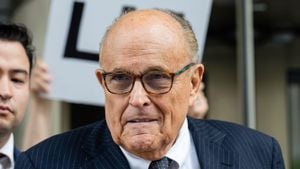Across the United States, the spotlight is shining on lawsuits against law enforcement agencies, igniting discussions about accountability, systemic issues, and the importance of reform. Recent high-profile cases have sparked debates about the conduct of police officers, policies within departments, and the extent of citizen rights when interacting with law enforcement. Many communities are grappling with the aftermath of incidents involving excessive force or misconduct, and as the legal battles mount, so does the urgency for change.
One notable case to surface is the lawsuit filed by the family of Tyre Nichols, who tragically died after being stopped by police officers from the Memphis Police Department. According to the filing, the officers involved allegedly used excessive force, resulting in Nichols' death. This case has not only drawn national attention but has also resurrected conversations about police brutality and reform. Activists and advocates are calling for stricter regulations concerning police use-of-force policies, citing the need for comprehensive training and accountability measures.
The Nichols case fits within broader patterns seen across the nation, where communities have reacted strongly to perceived injustices. Moments of unrest have often followed incidents of police violence, with citizens taking to the streets to demand justice and change. According to data compiled by various civil rights organizations, there has been a notable increase in lawsuits filed against law enforcement agencies—particularly those involving allegations of excessive force and wrongful death.
Adding fuel to the fire, the recent findings from the U.S. Department of Justice indicating systemic issues within numerous police departments have heightened the stakes. Their reports show patterns of discriminatory practices, excessive use of force, and inadequate training among officers. With these findings, the federal government has begun implementing oversight measures, and more lawsuits are expected as this scrutiny intensifies.
Advocates for reform argue these lawsuits are necessary not just for justice for victims and their families but also to signal to police departments across the country the need for accountability. Through the lens of litigation, these advocates seek to highlight how systemic issues take root and persist, often leading to tragic outcomes for innocent citizens.
The impact of these legal actions is stirring mixed feelings within law enforcement communities. While many officers uphold their dedication to serving and protecting, allegations of misconduct can erode public trust. Police departments are often caught between maintaining morale, holding officers accountable for actions, and addressing community concerns. Local governments face difficult decisions filled with financial and reputational repercussions as they tackle these lawsuits, weighing the costs against possible reforms.
It’s notable to mention the emergence of various community-led initiatives aiming to bridge gaps between law enforcement departments and the public they serve. These initiatives often prioritize transparency, community engagement, and reform. Grassroots organizations have emerged to advocate for change, utilizing litigation as one tool among many to affect systemic change from within. They argue the growing resource expenditure on legal disputes could be redirected to community building and preventive measures.
One solution gaining traction is the advocacy for civilian oversight boards, proposed as forms of checks on law enforcement agencies. The idea is to establish independent review processes for police actions, especially those involving allegations of misconduct. Such boards consist of community members who can provide insights, voice concerns, and aid in creating accountability structures within police departments. More cities are adopting this strategy, reflecting the demands for change reverberated through recent lawsuits.
While the lawsuits and community protests aim for tangible reform, achieving lasting change will take continued effort from all sides. This includes unbiased investigations, dedicated policy reform, and fostering relationships built on mutual respect and trust. Many individuals believe civic engagement is at the heart of meaningful change; as citizens become more involved, their voices can drive attention to pressing issues involving law enforcement.
It is also worth considering the economic ramifications of these lawsuits, which add strain on taxpayer funds. Cities facing extensive litigations often allocate significant portions of their budgets to settlements and legal fees. This redirection can lead to decreased funding for community services and programs, raising concerns about overall welfare. Hence, the stakes are high—not just for those directly involved but for entire communities relying on local government support.
Alongside monetary challenges, there's also the matter of public confidence. Frequent media coverage of police-involved incidents and the subsequent legal outcomes shape perceptions of law enforcement as well. Continuous negative publicity can undermine public trust and prompt governmental evaluations of existing laws and practices. The discussions swirling around the subject of police misconduct are multi-faceted, laden with complex societal dynamics.
Multiple stakeholders are now encouraged not just to react to incidents of police violence but to proactively address systemic weaknesses. Legislators, community leaders, and law enforcement professionals must engage in dialogues aimed at facilitating transparency and ensuring responsive governance. Collaboration between police and communities may help demystify officers' roles and responsibilities leading to improved relationships.
Some cities have already taken preliminary steps toward reform, such as revising use-of-force policies, improving training, and establishing community policing initiatives. These approaches seek to redirect the focus from punitive actions to building rapport and cooperation, fostering healthier interactions between officers and constituents. Police departments need to represent the communities they serve, ensuring diversity and inclusion reflect throughout the ranks.
Grassroots movements pushing for accountability serve as reminders of the power individuals have to incite change. A united voice spotlighting instances of injustice increasingly holds authorities accountable, urging them to act. Lawsuits driven by survivors and their loved ones are powerful narratives interwoven with the larger fight for civil rights and systemic reform.
Moving forward, it's clear the lawsuits against law enforcement agencies will remain significant, prompting continuous discussions surrounding policing and justice. The road to reform requires persistent advocacy, community engagement, and the commitment of law enforcement to uphold the values of justice and equality. Only through collaboration can positive changes be made, leading to safer communities and more accountable policing.
Overall, as lawsuits against law enforcement agencies proliferate, society stands at a crossroads. This pivotal moment creates opportunities to reassess systems and structures allowing for injustices to persist. By taking bolder steps toward ensuring accountability and justice, communities can strive toward the inclusive, fair future they envision for everyone.



